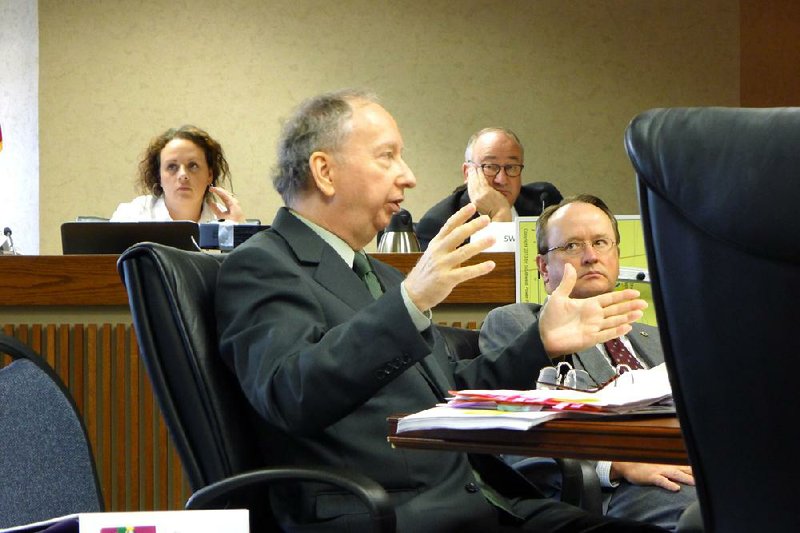LITTLE ROCK - The environmental impact study for a high-voltage power line in Northwest Arkansas was done backward, said Mick Harrison, an attorney for Save the Ozarks, an organization that opposes the project.
“What came out today showed it was the result of a biased process, to support a decision already made,” he said Tuesday. “You really should gather your data, then draw your conclusions.”
Harrison made the comment after the second day of what could be a week-long hearing before the Arkansas Public Service Commission.
Southwestern Electric Power Co. filed with the commission on April 3 to build a 345-kilovolt power line from a proposed Kings River Station near Berryville to the Shipe Road Station near Centerton. The line would be 46 miles to 59 miles long, depending on the route chosen.
Burns & McDonnell Engineering Co. of Kansas City, Mo., prepared the environmental impact study. Harrison said the document doesn’t address Northwest Arkansas’ karst topography, which creates caves and sinkholes and complicates the construction of transmission towers that require foundation holes to be dug50 feet deep and 10 feet wide.
For hours on Tuesday afternoon, Harrison cross-examined Stephen Thornhill, project manager with Burns & McDonnell, about the study. Harrison said it appeared much of the study was rehashed from an earlier one.
“We know half of this came from the Flint Creek-Shipe Road document and didn’t get edited out,” Harrison said during the hearing.
During a break in the hearing, David Matthews, a Rogers attorney who represents SWEPCO, said it’s normal in the computer age to use “templates” for documents, and he’s been doing it for 15 years. So it wouldn’t be unusual for some of the wording to be the same in two environmental impact studies, he said.
The power line proposal has generated thousands of comments from people opposed to the project. Those comments were voiced last month during three days of public hearings - two in Eureka Springs and one in Rogers - and filed electronically with the commission.
Connie Griffin, an administrative law judge with the commission, is overseeing the hearing at the commission’s headquarters in Little Rock.
Griffin must reach a decision within 60 days of the end of the hearing, said John Bethel, the commission’s executive director. But the three-person commission can overrule Griffin, and opponents can appeal the commission’s decision to the Arkansas Court of Appeals, said Bethel.
Harrison repeatedly asked about specific dates and details that neither Thornhill nor Richard A. Coffman could remember. Coffman is an assistant professor of civil engineering at the University of Arkansas at Fayetteville who testified before Thornhill. At one point during Harrison’s cross-examination of Thornhill, Matthews objected, saying, “The testimony is not whether the witness has a photographic memory.”
Initially, six routes were proposed, but three of those have been dropped from consideration after SWEPCO learned that it would be difficult to get an easement from the U.S. Army Corps of Engineers to put lines over an “undisturbed” part of Beaver Lake. Eminent domain doesn’t apply to federal property.
Three routes are still being considered: 33, 108 and 109. The routes are primarily in Benton and Carroll counties.
From a proposed Kings River substation near Berryville heading west, Route 33 would travel north of Eureka Springs, through Gateway and Garfield, then southwest between Bentonville and Bella Vista. That route would cost about $96.3 million.
Route 108 would go south into Madison and Washington counties before crossing Bethel Heights and along the western edge of Cave Springs. Constructing that route would cost about $117.4 million.
Route 109 would go north of Eureka Springs, then north along the Arkansas-Missouri line before turning south on the west side of Bella Vista. That route would cost $102.8 million.
Six towers would be needed every mile and would average 130-160 feet tall, according to the company’s proposal. A150-foot-wide right of way also would be required.
The line is necessary to meet growing electricity needs in northern Arkansas and southern Missouri, according to SWEPCO. Other companies would be able to use electricity that is transported by the transmission line.
SWEPCO has said it wants the approval process and design engineering done by December. After right-of-way acquisition, construction is scheduled to begin by March 2015.
The company wants the new line to be in service by June 2016.
Arkansas, Pages 9 on 08/28/2013
